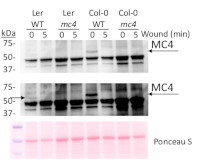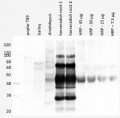1

Anti-MC4 | Metacaspase-4
AS19 4318 | Clonality: Polyclonal | Host: Rabbit | Reactivity: Arabidopsis thaliana
- Product Info
-
Immunogen: KLH-conjugated peptide derived from Arabidopsis thaliana MC4, UniProt: O64517, TAIR: At1g79340 Host: Rabbit Clonality: Polyclonal Purity: Immunogen affinity purified serum in PBS pH 7.4. Format: Lyophilized Quantity: 50 µg Reconstitution: For reconstitution add 50 µl, of sterile water Storage: Store lyophilized/reconstituted at -20°C; once reconstituted make aliquots to avoid repeated freeze-thaw cycles. Please remember to spin the tubes briefly prior to opening them to avoid any losses that might occur from material adhering to the cap or sides of the tube. Store lyophilized/reconstituted at -20°C; once reconstituted make aliquots to avoid repeated freeze-thaw cycles. Please remember to spin the tubes briefly prior to opening them to avoid any losses that might occur from material adhering to the cap or sides of the tube. Tested applications: Western blot (WB) Recommended dilution: 1 : 1000 (WB) Expected | apparent MW: 45.5 kDa - Reactivity
-
Confirmed reactivity: Arabidopsis thaliana
Predicted reactivity: Not reactive in: No confirmed exceptions from predicted reactivity are currently known - Application Examples
-

10 day old Arabidopsis thaliana seedlings, Ler wild type (WT), Col-0 (WT) and MC4 T-DNA insertion mutants Ler mc4 and Col-0 mc4. Grown on 1⁄2 MS medium (no addition of sugar). • Complete seedlings were grinded on liquid nitrogen and tissue powder was immediately mixed with denaturing Laemmli buffer preheated at 70 °C and further denatured at 70 °C for 10 min (= 0 minutes of wounding). Alternatively, tissue powder was kept at room temperature for 5 minutes and mixed with denaturing Laemmli buffer preheated at 70 °C and further denatured at 70 °C for 10 min (= 5 minutes of wounding). • An equal volume of leaf grinded on liquid nitrogen was mixed with denaturing 2x Laemmli buffer preheated at 70 °C and further denatured at 70 °C for 10 min. Samples were separated on 12 % SDS-PAGE (stainfree, BioRad) and blotted 7 minutes to PVDF (pore size of 20 um), using semi-dry (BioRad Turboblot) . Blot was blocked with 5% milk for 2h/RT with agitation. Blot was incubated in the primary antibody at a dilution of 1: 1 000 ON/4°C in PBS-T, 1% milk, with agitation. The antibody solution was decanted and the blot was rinsed briefly twice, then washed three times for 10 min in PBS-T at RT with agitation. Blot was incubated in Agrisera matching secondary antibody (Goat anti-rabbit IgG horse radish peroxidase conjugated, AS09 602) diluted to 1:10 000 in PBS-T, 1% milk, for 2h/RT with agitation. The blot was washed as above and developed for 1 min with Agrisera ECL Superbright. Exposure time was 1-10 seconds.
Clear band at correct height of approximately 55 kDa in Col-0 at 0 minutes of wounding. After 5 minutes, MC4 autocatalytically cleaves itself to be activated, so the full length MC4 band at 55 kDa disappears.
This band is clearly absent in Col-0 mc4 which is a clear evidence for specific detection of MC4 in Col-0.
Courtesy Dr. Simon Stael,VIB-Ugent Center for Plant Systems Biology, Ghent University, Belgium - Additional Information
-
Additional information (application): Full-length MC4 (zMC4) disappears upon wounding. Accumulation of specific lower weight bands of active MC4 subunits, p20) is not detected with this antibody. - Background
-
Background: MC4 (Metacaspase-4) is a cysteine protease that cleaves specifically after arginine or lysine residues. Does not cleave caspase-specific substrates. Plays a positive regulatory role in biotic and abiotic stress-induced programmed cell death. Alternative names: AtMCP2d,Metacaspase 2d - Protocols
-
Agrisera Western Blot protocol and video tutorials
Protocols to work with plant and algal protein extracts
Agrisera Educational Poster Collection - Reviews:
-
This product doesn't have any reviews.



